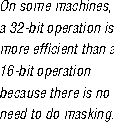char is guaranteed to hold only 0 to 127, and can be either unsigned or signedchar; you cannot assume one or the other. Avoid char unless you do not care about sign extension.
unsignedchar can hold from 0 to 255; it can hold more.
signedchar can hold from -127 to +127; it can hold more.
short can hold from -32,767 to 32,767 (signed) or 0 to 65,535 (unsigned).
int can hold from -32,767 to 32,767 (signed) or 0 to 65,535 (unsigned). Ints cannot be counted on to hold any more than a short. If you need something larger than a short, use a long. If a short is big enough, use int instead to improve efficiency by taking advantage of a processor's natural word size.

int by casting it to a short, because that's all you're guaranteed to get.int because int doesn't have a portable representation.long can hold from -2,147,483,647 to 2,147,483,647 (signed) or 0 to 4,294,967,295 (unsigned).
float is a IEEE single-precision number and double is a IEEE double-precision number. This is because the Taligent Application Environment runs only on processors that support the IEEE floating point standard and that support the single- and double-precision types.
limits.h and float.h. However, remember that the values of these symbols can change from processor to processor or compiler to compiler, within the limits defined above (for more information, see the ANSI/ISO C specification).
In general, watch your assumptions carefully, and use typedefs instead of C types. For examples, see "Avoid raw C types with dimensions" on page 66.